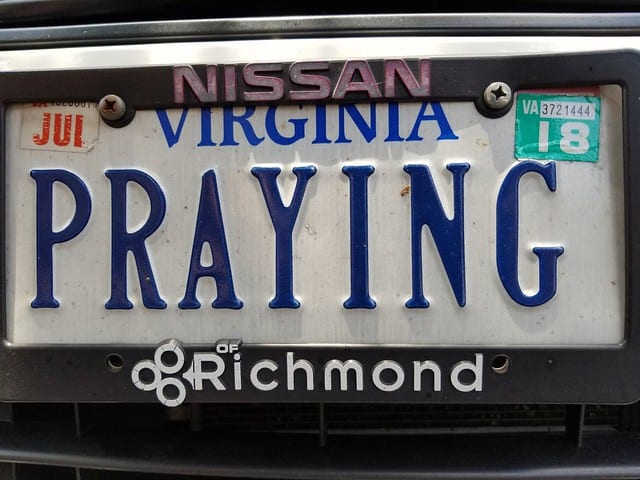
Why Do We Pray For People?
It often feels like my social media screens overflow with requests asking me to pray for people.
The pandemic and all of its accompanying stresses are obvious sources of people asking for prayer. I know quite a few people who deal with parents who are growing older and other health challenges. A friend of mine who has stage-four cancer just lost his wife, the love of his life, to her own fight with cancer.
People are losing their jobs, not only their livelihoods but the careers they had dreamed about all their lives. Work is becoming more difficult.
There is a loss of hope and a growing sense of despair. More of us are willing to ask each other to pray for us.
A couple of weeks ago someone in one of the groups I frequent on Facebook asked for people to pray for them. I said I would, and received a response from someone else in the group which provoked my thinking.
“Why do we pray for people?” they asked. They explained their question in a reasonable, researched way. As far as they could tell, there is no evidence at all for circumstances changing because we pray for people. To their mind, praying for other people, no matter how empathetic we might be, does not do them any good.
They asked whether, instead of praying for people, there might be something we could do to actually help them.
Do we pray for people? If we do, why do we? Do we believe we are doing something effective to help them when we pray for them?
Is there a difference between praying for someone and offering our “thoughts and prayers?”
How does prayer work, and what exactly changes when we pray?
When We Pray for People
What are we doing when we pray for people?
When we pray we are not trying to persuade or influence God. It is not as if we see things God might have missed or need to make sure nothing gets lost.
Praying is not a celestial customer service number we can call when we need help, a last resort or Hail Mary(in several ways) when nothing else works.
Prayer is about recognizing when we are aligned with spiritual life. We bring our concerns and loves, our ideas and anxieties into the light. Praying helps us develop and sustain our spiritual perspective.
We look and listen, discerning how our desires fit into spiritual life.
When we read about or watch some tragedy happening somewhere in the world we pray. It is not because we expect, somehow magically, the damage will not have happened. We bring the situation and the people directly affected by it into the sacred light of truth.
Prayer is a recognition we want to do what we can. We are paying attention and sharing our time and energy.
Our prayer is not about influencing God, but about how spiritual life influences us. We open ourselves to its healing, loving presence. Praying is how we remember spiritual life within us and in the world so we can put our trust into it.
When we pray for people it is not a magic spell or a formula to get what we want. My prayer is most often about recognizing and remembering I cannot control what happens.
We do not wield spiritual life like a wand or a light saber. It flows through us when we allow ourselves to be open and honest.
When we pray for people it is an opportunity to practice spiritual life in our everyday lives.
How We Pray for People
Some of us set aside particular times each day to pray for people.
It is not because those times are more spiritual or make our prayer more effective. Some of us who practice praying at regular times need reminders to pray scheduled throughout our days.
Our lives are filled with responsibilities and distractions. We hope to develop an attitude of prayer we can practice throughout our everyday lives. It is easy to get caught up in other things and forget how much we would like to be praying.
If it is helpful, we can set times in our daily calendars which remind us to pray for people. Some of us pray in the morning and in the evening.
We do not need to go to a special place or say particular words. Our prayer may be simply taking time each day to listen to sacred stillness within us and around us.
Some people practice praying while they walk and others while they are sitting down. We may pray with our eyes closed or with them open.
Praying is not about following rules, but about being open and aware.
The key is finding what works for us.
It Makes a Difference When We Pray For People
No matter when or how we pray, praying for people changes how we experience our lives.
Praying is not an attempt to change our circumstances, but how we experience them. We take time to be open to the presence of spiritual life within us and around us.
Praying is not a substitute for taking action. We pray and listen to sacred stillness to discern how we will act. Our practice of prayer makes differences within us. The differences change how we live our everyday lives.
Our praying is not a search for the answers. As we pray we listen for new questions and new insights to shape how we live our lives.
We do not pray to change the way things are, but to change the ways we experience ourselves and our lives.
Like any spiritual practice, praying becomes integrated into our lives over time. As we practice prayer we experience it helping us learn and grow. Praying is part of our lifelong journey into becoming who we can be.
Praying for people is more than an immediate moment. Our practice of prayer builds over time.
When will we take time to pray for people today?
Why will we pray for people this week?
[Image by Gamma Man]
Greg Richardson is a spiritual life coach in Southern California. He has served as an assistant district attorney, an associate university professor, and is a lay Oblate with New Camaldoli Hermitage near Big Sur, California. Greg’s website is StrategicMonk.com and his email address is [email protected].












